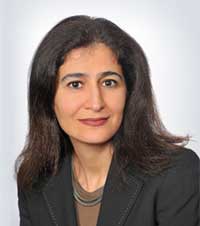Safety and efficacy of a possible epigenetic therapy for FSHD muscular dystrophy
2021
Lead investigator

Dr. Rima Al-Awar
Ontario Institute for Cancer Research
Toronto, Ontario
Collaborators & Co-Investigators
- Davide Gabellini, PhD
- Gunnar Schotta, PhD
- Serpil Eraslan, PhD
- Gabriele Siciliano, MD, PhD
Research Sites & Affiliations
- IRCCS Ospedale , San Raffaele, Italy
- Ludwig-Maximilians-Universität München, Munich, Germany
- Koc University Hospital, İstanbul, Turkey
- Azienda Ospedaliera Universitaria Pisana, Pisa, Italy
Budget: $1,747,846
Disorders: Facioscapulohumeral muscular dystrophy
Research Areas: Discover Novel Treatments & Therapies
Abstract:Facioscapulohumeral muscular dystrophy (FSHD) is the most prevalent muscle disease that afflicts both children and adults regardless of their gender. FSHD is caused by aberrant gain of expression of the double homeobox 4 (DUX4) gene causing toxic effects in muscle cells. Despite the consensus on the pivotal role of DUX4 and several clinical trials, there is currently no cure or an effective therapeutic approach for FSHD patients. In our studies, we identified a novel regulator of DUX4 expression. Targeting this factor allows to block DUX4 expression and rescues the pathogenic behavior of muscle cells from FSHD patients. The treatment is safe to healthy muscle cells. Based on our results, we will use cellular and animal models of the disease to investigate a novel pharmacological approach that could represent a promising therapeutic option for FSHD patients.
Impact:
